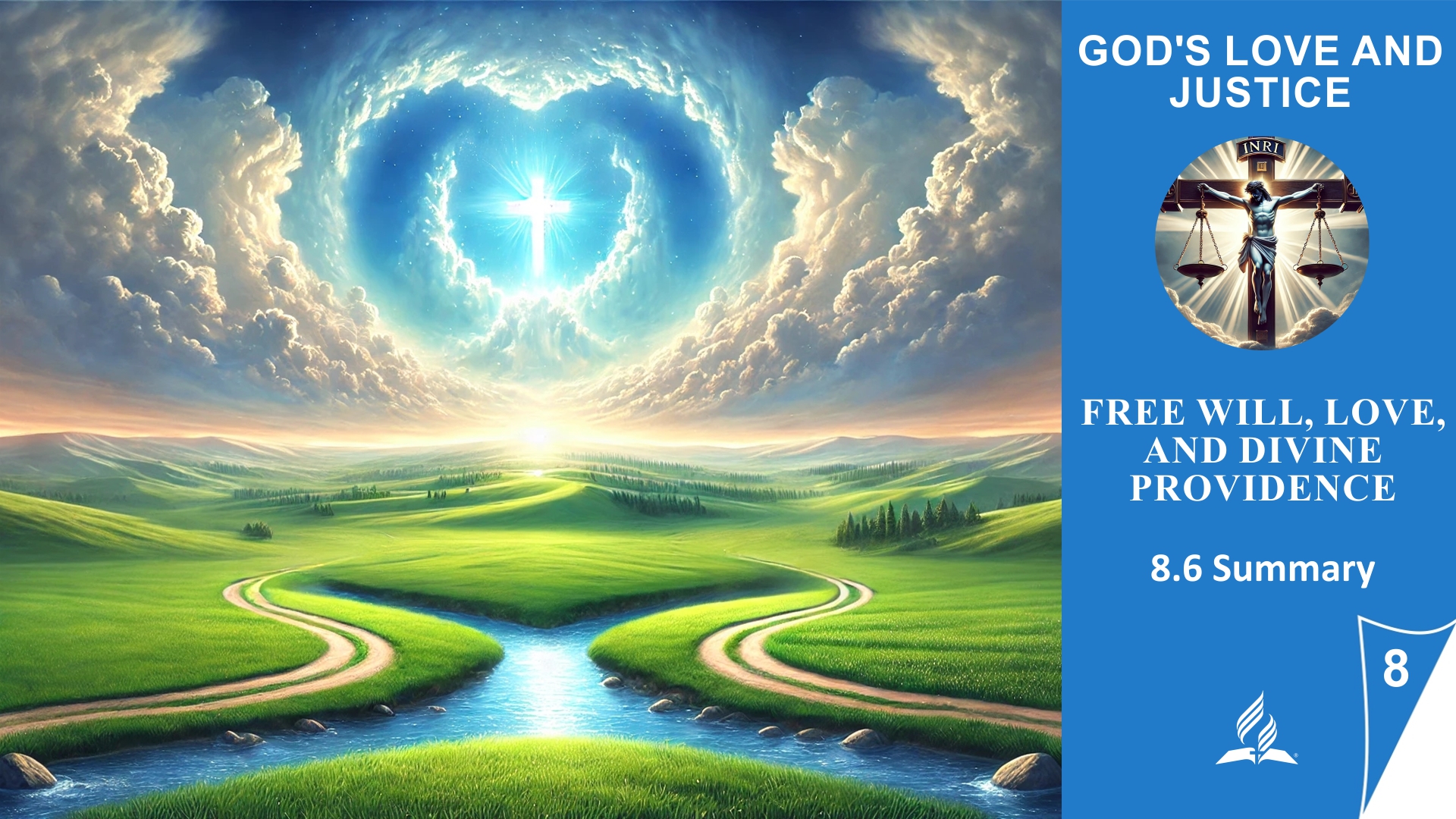


8.6 Summary
God’s Sovereignty and Human Free Will
Lesson 8 explores the fascinating interaction between God’s omnipotence, human free will, and His divine providence. Central questions include: How does God act in the world? How much freedom does humanity have? And how does God’s love fit into all this?
8.1 Our Sovereign God – God’s Will and Human Decisions
God is the ruler of the world, yet He does not force humanity. He created people with free will, meaning not everything that happens aligns with His ideal will. Suffering and injustice are often the result of human choices or the fallen state of the world.
➡️ Core Message: God invites but does not force. Our choices have consequences. Despite rejection, God’s love endures.
8.2 Pantokrator – God’s Omnipotence and Human Freedom
God is almighty (Pantokrator), yet He never abuses His power. He desires all to be saved but respects free will. Though God could control everything, true love requires freedom.
➡️ Core Message: God’s omnipotence manifests not in coercion but in His sovereign love that grants freedom. Our decisions matter, yet God can turn even our mistakes into good.
8.3 To Love God – Love Cannot Be Forced
God desires us to love Him wholeheartedly. Love is genuine only when given freely. Free will is a gift, but it carries responsibility.
➡️ Core Message: Our relationship with God is based on a free decision. God invites us to reciprocate His love but never imposes it.
8.4 God’s Ideal and Remedial Wills – God’s Plan: Freedom and Restoration
God’s ideal will is for all to be saved. However, He considers our choices and works healing even when we stray. Even poor decisions can be woven into His redemptive plan (Romans 8:28).
➡️ Core Message: Even when we fail, God can bring good from it. Our free will is real, but God’s love and healing remain ever accessible.
8.5 Christ Has Overcome the World – Hope Despite Suffering: Christ Has Won
In a world filled with pain, Jesus offers hope. He has overcome the world (John 16:33). Suffering is part of this fallen world but does not have the final word. Christ’s victory on the cross gives us peace and assurance.
➡️ Core Message: We stand on the side of victory. No matter how hard life becomes, Christ walks with us through every challenge.
Overall Conclusion:
God is omnipotent, yet He forces no one. He invites, loves, and guides while respecting our free will. This freedom brings responsibility. Suffering and injustice often stem from human choices, but God remains sovereign and can bring blessings even from hardships. Christ has overcome the world—allowing us to live with hope and trust.
➡️ Key Takeaway: God’s love never forces—it invites. Our decisions matter, but God’s providence and love surpass our failings. 🙌
Lesson 8 reveals how the interplay of God’s omnipotence, human free will, and His love influences our everyday decisions, lifestyle, and faith journey.
-
Responsibility for Our Decisions
➡️ In daily life:
-
We are not puppets. Each day presents choices—how we speak, act, and respond.
-
Our actions have ripple effects, impacting both ourselves and others.
-
Instead of blaming God for hardships, we can reflect on our own choices.
➡️ In faith:
-
We are called to seek God’s will and make conscious decisions that honor Him.
-
Prayer offers guidance and clarity for wise decisions.
-
Hope in Difficult Times
➡️ In daily life:
-
Challenges and disappointments are part of life, yet God accompanies us through them.
-
Even when overwhelmed, we can trust God to bring good from every circumstance (Romans 8:28).
➡️ In faith:
-
Trials strengthen our trust when we cling to God during hardships.
-
Suffering isn’t meaningless—God uses it to shape us and cultivate empathy.
-
Love and Freedom in Relationships
➡️ In daily life:
-
Just as God approaches us with love and patience, we should avoid coercing others.
-
True love in family, friendships, and work respects freedom.
➡️ In faith:
-
God never forces belief. We, too, should share faith with love, not pressure.
-
Authentic love speaks louder than arguments, touching hearts deeply.
-
Prayer as Trust, Not Control
➡️ In daily life:
-
Prayer isn’t about convincing God but aligning with His will.
-
We can be honest with our worries while trusting His perfect knowledge.
➡️ In faith:
-
Prayer often transforms our hearts before our circumstances.
-
We discover peace beyond understanding, even when answers delay.
-
Faith Means Trusting, Not Always Understanding
➡️ In daily life:
-
Some situations defy comprehension. Instead of dwelling on “Why?”, we can ask, “How can I trust God here?”
-
God’s ways surpass ours—relieving us from the burden of full understanding.
➡️ In faith:
-
Trust means believing God walks with us, even when the path is unclear.
-
We live not in fear of mistakes but in the assurance that God’s grace exceeds our flaws.
-
Courage for Repentance and Forgiveness
➡️ In daily life:
-
Free will includes the chance to correct our course. Mistakes aren’t final.
-
Healing in relationships begins with the bravery to seek reconciliation.
➡️ In faith:
-
God’s forgiveness is always available; we need not remain trapped in guilt.
-
His love outmatches our failures.
Final Reflection:
Lesson 8 urges us to live consciously, boldly, and with trust. God grants us freedom coupled with responsibility. We are invited to act in love, pursue justice, and hold onto hope, knowing God holds all things in His hands. His providence doesn’t promise a trouble-free life but assures that He can transform all things for good.
➡️ Key thought for daily living:
-
Make decisions rooted in love and God’s wisdom.
-
Trust, even when you don’t understand.
-
Cling to God’s promises—He will never abandon you.

Every day is a fresh opportunity to experience and reflect God’s love.
(Visited 53 times, 1 visits today)





















